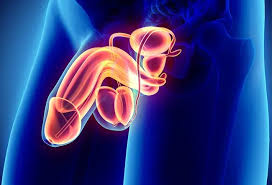
Overview
Penile cancer begins in the skin or tissues of the penis, most often on the glans or foreskin. Though rare, it can be aggressive if not caught early. The most common type is squamous cell carcinoma.
Symptoms
- Growth, ulcer, or lump on the penis
- Redness, rash, or irritation
- Foul-smelling discharge
- Bleeding or pain
- Swelling in the groin (enlarged lymph nodes)
Causes & Risk Factors
- Human papillomavirus (HPV) infection
- Poor genital hygiene
- Uncircumcised status
- Smoking
- Age >50
- Phimosis (inability to retract foreskin)
Diagnosis
- Physical and genital examination
- Biopsy of the lesion
- Imaging (CT, MRI, or PET) for staging
- Inguinal lymph node assessment
Treatment Options
- Topical chemotherapy or laser ablation (for superficial lesions)
- Surgical excision (circumcision, partial or total penectomy)
- Lymph node dissection
- Radiation therapy
- Chemotherapy (for advanced/metastatic disease)
Prognosis
- Highly curable when detected early
- 5-year survival rate:
- Localized: ~85%
- Regional: ~60%
- Distant: ~12%
Living with this Cancer Type
- Body image and sexual function support
- Psychological counseling
- Postoperative rehabilitation
- Regular urologic follow-up
Prevention & Screening
- HPV vaccination
- Good genital hygiene
- Early treatment of phimosis
- Avoid tobacco use
FAQs
Q: Is penile cancer common?
A: No, it’s rare but serious if not diagnosed early.
Q: Can it affect sexual function?
A: Yes, depending on treatment. Support and counseling are essential.
Q: Can it be prevented?
A: HPV vaccination and circumcision may reduce risk.
Resources
- Urology Care Foundation
- American Cancer Society
- ClinicalTrials.gov
Understand Precision Testing
Learn how liquid biopsy and chemo sensitivity testing can personalize your treatment plan.
Make Informed Decisions
Gain knowledge to actively participate in treatment discussions with your healthcare team.
Improve Treatment Outcomes
Discover how precision medicine and metabolic therapies can enhance treatment effectiveness.
Start Your Educational Journey Today
Empower yourself with knowledge about precision metabolic oncology and take an active role in your cancer care journey.
Need More Information?
Our team of oncology experts is here to help you understand your diagnosis and treatment options.
